US budget battle: Five key players
- Published
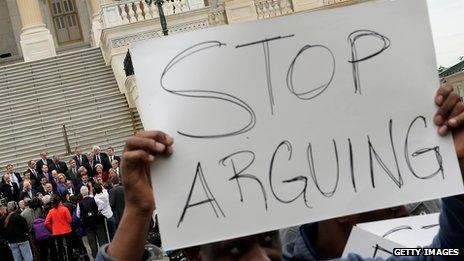
A protestor at the US Capitol expresses the frustration felt by many Americans
Washington is deadlocked by yet another budget brawl, with the government in partial shutdown and the debt ceiling soon to expire.
As the Republicans and Democrats continue to bicker, we profile the key players in the latest political bout of fiscal brinkmanship.
John Boehner
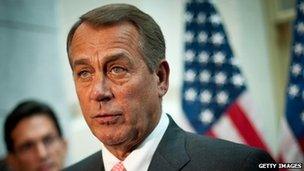
John Boehner, a Republican from Ohio, is the Speaker of the House of Representatives, the lower chamber of Congress. The job, which is third in the line of succession for the presidency, comes with significant power to set the agenda for the legislative body, from which all tax and spending bills must originate. Any legislation passed by the House must also be approved by Senate, currently controlled by Democrats, before being submitted to the president for his signature.
Mr Boehner has served as speaker, a position that is determined by a vote of all members of the House at the beginning of each biannual congressional session, since January 2010. Republicans currently control 232 of the 435 seats in the House, which means his speakership is dependent on continued support from members of his party. In 2012, eight conservative Republican representatives voted against Mr Boehner.
Having served in the House since 1991, Mr Boehner is considered to be an establishment Republican, traditionally loyal to business interests and willing to negotiate with Democrats to advance conservative positions. His leadership decisions recently have been questioned by more hardline conservatives, many of whom came to Congress in 2010 as part of the Tea Party movement, which formed in opposition to the policies of President Obama. One of their primary goals is the repeal of the Democrats' healthcare law.
Barack Obama
The Democratic US president is serving his second and final four-year term in office, having been re-elected in November 2012.
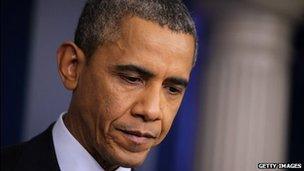
Although Mr Obama was able to advance his legislative agenda during his first two years in office, when his party controlled Congress, since 2011 he has been frustrated by Republicans in the House of Representatives, who have refused to consider any of his priorities and have repeatedly voted to repeal his healthcare law.
Mr Obama has negotiated with Republicans over the debt limit and the US budget in the past, but those negotiations have always been resolved before a government shutdown. In 2011, Mr Obama's Democratic supporters believed he ceded too much to Republicans, including mandatory cuts in discretionary spending, called the "sequester," which went into effect in January 2013.
This time around, Mr Obama says he will not make concessions under threat of government shutdown or default, and that it is Congress' job to sort out the nation's budget and once again raise the borrowing limit.
Tea Party
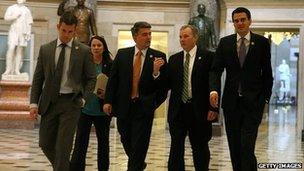
The Tea Party, which takes its name from the 1773 Boston Tea Party uprising against British taxes, is a grassroots conservative movement that first came to prominence in 2009. It formed in opposition to Mr Obama's first-term legislative agenda, including healthcare, increased government spending, environmental regulation and a bailout of the automobile industry.
Although the Tea Party exists within the Republican party, and has garnered the backing of many big-money Republican activists, its supporters often work counter to the agenda of the established party leadership.
Tea Party supporters have run for office against Republican incumbents that they consider insufficiently dedicated to conservative causes. This has sometimes caused headaches for the party leadership and unsettled individual officeholders, as hardline Tea Party candidates have ousted Republican incumbents and then lost otherwise winnable general election races. It has also spawned a Republican faction that is not as accountable to the party leadership.
In Congress, this faction is led by freshman Senators Ted Cruz of Texas and Mike Lee of Utah. There are also several dozen members of the House of Representatives who have so far prevented Mr Boehner, the House leader, from bringing forward any budget legislation that does not delay or dismantle healthcare reform.
Harry Reid
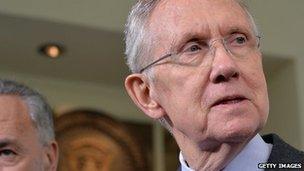
Senator Harry Reid of Nevada is the majority leader of the Senate Democrats, who control the upper chamber of Congress. He has served in that position since 2006 and was re-elected to the Senate in 2008.
Despite low approval ratings in his home state, Mr Reid won his last election thanks to his conservative Tea Party opponent's gaffes and extreme positions. It was an outcome that angered establishment Republicans, who had backed a more mainstream candidate.
Mr Reid has, so far, kept the 54 Senate Democrats in the 100-seat chamber unified in rejecting efforts by the Republican-controlled House of Representatives to tie government funding legislation to changes in the healthcare law.
He is currently working to get the Senate to approve a "clean" debt-limit extension, but if he is to be successful, he will have to win over some Republicans, as Senate rules grant the minority party more rights than are enjoyed by their counterparts in the House of Representatives.
Paul Ryan
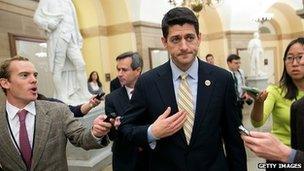
Paul Ryan has been a Republican member of the House of Representatives since 1999. He was the Republican nominee for vice-president during the 2012 presidential elections.
The Wisconsin representative is often seen as the leader of the Republican party's strategy on the federal budget. He has long argued for cutting government spending and shrinking the size of the government.
Although he has been largely absent from the early shutdown skirmishes, Mr Ryan recently published an article outlining his plan for breaking the current Congressional impasse, which could form the framework for a negotiated deal between Republicans and Mr Obama.
In an opinion article, external in the Wall Street Journal, Mr Ryan argued: "To break the deadlock, both sides should agree to common-sense reforms of the country's entitlement programs and tax code."
Notably, Mr Ryan did not mention anything about the healthcare law, an omission which has angered Tea Party conservatives.